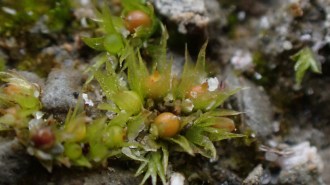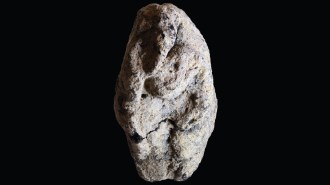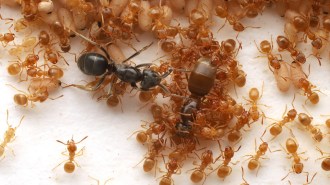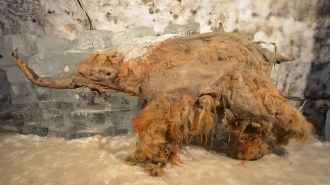News
-
 Life
LifeRats are snatching bats out of the air and eating them
The grisly infrared camera footage records a never-before-seen hunting tactic. It may have implications for bat conservation.
-
 Health & Medicine
Health & Medicine3,000 steps per day might slow Alzheimer’s disease
In people at risk for Alzheimer’s disease, researchers linked minimal to moderate physical activity to a 3-to 7-year delay in cognitive symptoms.
By Meghan Rosen -
 Animals
AnimalsLions have a second roar that no one noticed until now
A machine learning analysis of wild lion audio reveals they have two roar types, not one. This insight might help detect where lions are declining.
By Elie Dolgin -
 Health & Medicine
Health & MedicineA diet low in glutamate may ease migraines
People with Gulf War Illness found relief from migraines after a month on a low-glutamate diet, hinting at a new way to ease symptoms.
-
 Plants
PlantsMoss spores survived in space for 9 months
The moss species Physcomitrium patens is the latest organism to survive an extended stay in the vacuum and radiation of space.
By Jay Bennett -
 Health & Medicine
Health & MedicinemRNA flu vaccines are making their way through clinical trials
The mRNA platform offers the advantage of faster vaccine production, which could allow more time to decide on which flu strains to cover.
-
 Health & Medicine
Health & MedicineIn animal tests, this needle-free insulin acted as fast as injections
Managing diabetes with injections is challenging. Joining insulin to a skin-penetrating polymer was as effective as shots at regulating blood sugar.
By Simon Makin - Artificial Intelligence
Chatbots may make learning feel easy — but it’s superficial
People who use search engines develop deeper knowledge and are more invested in what they learn than those relying on AI chatbots, a study reports.
By Payal Dhar -
 Archaeology
ArchaeologyA clay figurine unveils a storytelling shift from 12,000 years ago
A carefully crafted figure of a goose and a woman suggests that art reflecting spiritual beliefs entered a new phase among early villagers in the Middle East.
By Bruce Bower -
 Animals
AnimalsA wolf raided a crab trap. Was it tool use or just canine cunning?
Video from the Haíɫzaqv Nation Indigenous community shows a wolf hauling a crab trap ashore. Scientists are split on whether it counts as tool use.
By Elie Dolgin -
 Animals
AnimalsThis parasitic ant tricks workers into committing matricide
Newly mated parasitic queen ants invade colonies and spray their victims with a chemical irritant that provokes the workers to kill their mother.
-
 Animals
Animals40,000-year-old woolly mammoth RNA offers a peek into its last moments
Ancient RNA from Yuka, a 40,000-year-old woolly mammoth preserved in permafrost, can offer new biological insights into the Ice Age animal’s life.
By Meghan Rosen